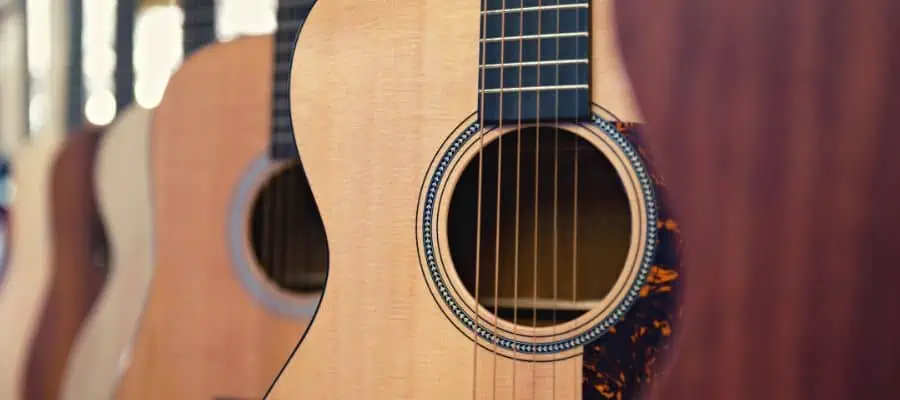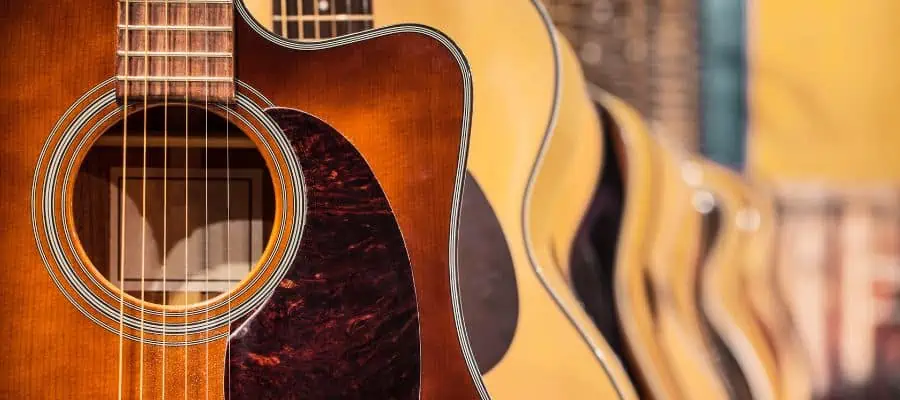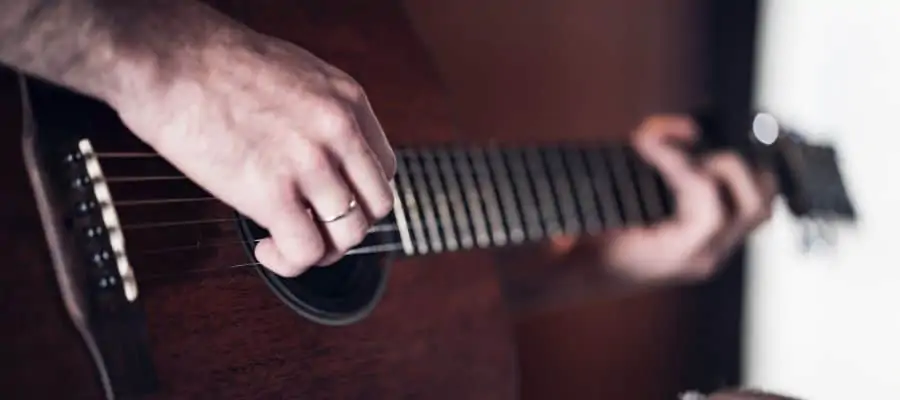For many guitarists who like to experiment with different guitars or want to expand their instrument collection, 12-fret guitars are an amazing option. These unique guitars have been getting more and more popularity in recent years. From electric wonders to acoustic or classic models, 12-fret guitars shine with their own distinct allure.
But what exactly are 12 fret guitars and what are the advantages and disadvantages of these types of guitars?
A 12-fret guitar is either an electric acoustic or classic guitar that has the neck joint at the 12th fret instead of the standard 14th fret. The main difference between these guitars is the reduced string tension and condensed fret spacing, which makes the playing experience easier and smoother, especially for fingerstyle players.
The main advantages of a 12-fret guitar are the warm and full sound, the ergonomic shape and size, the vintage appearance, the slinky hand feel, and responsiveness. However, 12-fret guitars are not as versatile, because the lower fret number makes it more difficult to play in lower registers. Moreover, they are rare and more expensive.
In the rest of this article, I will describe the pros and cons of guitars with 12 frets. I will explain how the frets may make a difference regarding sound, use, and other practical issues. Let’s get started!
The Pros of 12-Fret Guitars

12 Fret guitars are considered pretty unique since most guitars typically have a few more frets. However, the lower number does not necessarily mean that these guitars lack something. On the contrary, there are several advantages to 12-fret guitars.
12 Fret-Guitars Have a Warmer Sound
The main and probably most important advantage of 12-fret guitars is their rich and warm sound. A shorter fretboard means that the strings need to be closer to the frets for the tension to be just right. This shortened distance between the strings and the frets allows the guitar to have a bolder and richer sound.
Moreover, the lower positioning of the bridge contributes to a more resonant tone. Since the distance between the bridge and the guitar top is shortened, the soundboard is longer. The result of this increased soundboard size is a unique tonal character that creates a much fuller sound.
While different guitars are supposed to have various types of sounds and tones, acoustic instruments are typically sought after for their warm and sweet tones. The sound of 12-fret guitars is so unique that it makes them stand out among others.
12 Fret-Guitars Are Easier To Play
Generally, a shorter fretboard is considered easier to handle. With a typical fretboard, you may struggle a bit to play certain complicated chords, which may make it very difficult for you, especially as a beginner. Barre chords in particular are quite a challenge for beginners, and the longer fretboard is an extra issue that you would need to get past.
A shorter fretboard means condensed fret spacing, meaning that the frets are closer to each other. This reduces the stress on fretting hands, making the instrument easier to play. It makes accessing the lower and mid-range frets much easier, leading to easier chord, and fingerstyle playing.
With a shorter fretboard, you won’t suffer from these problems. Your arms can reach every fret smoothly, allowing you to play all the chords much easier and your arms to rest better. As a result, your arms and hands won’t get tired, even when playing the most difficult chords.
A shorter fretboard also means that the overall size of the guitar is typically smaller; this is especially beneficial for beginners, who are more comfortable with something lighter and smaller. The ergonomic shape and smaller size are very important advantages that make the 12-fret guitar preferable for a lot of musicians, especially people who are starting to learn how to play.
Another important aspect is the reduced string tension. As the scale is shorter, the strings are pulled weaker, increasing the playability significantly. As you need less force to play notes, you will feel playing the guitar, chord shapes, and general fretting are easier on hands and fingers.
12 Fret-Guitars Have a Cool Vintage Appearance
When it comes to appearance, 12-fret guitars are easily among the best-looking instruments you can find. These guitars are small and compact but also have a more vintage look. 12-fret guitars are considered old school because they were more common in the past; most classical guitars had 12 or 14 frets when they were first invented.
With shifted bridge position and shorter scale length, 12-fret guitars have a distinctive look that takes you back to the old-school era.
As a result, 12-fret guitars have a more traditional and classic look than other acoustic guitars with longer fretboards. If you like guitars with classic and old-school looks, 12-fret guitars can help you achieve a vintage appearance.
The Cons of 12 Fret-Guitars

Like every other instrument, 12-fret guitars have their disadvantages. The reduced number of frets can be beneficial for a warmer sound and a smoother playing experience, but it has its issues.
12 Fret-Guitars Are Quite Rare
12 fret guitars are pretty rare nowadays. As most guitars have the 14-fret layout, the amount of 12-fret guitars you can find in stores is pretty low. As a result, if you’re looking for a 12-fret guitar, you may not have a lot of options to look at and you may end up with the first guitar you encounter.
Most musicians like to test different types of tones and woods to see which one suits them better, but this may not be possible if you’re looking for a 12-fret guitar. So, going for a 12-fret guitar may mean sacrificing some other features you desire in your instrument.
12 Fret-Guitars Vary in Versatility
The reduced number of frets can be more comfortable, but it’s also more limiting when it comes to the chords you can play. Because the neck joint is located at the 12th fret, you will have more difficulty playing the higher frets, which can be quite limiting, especially for lead guitarists who like to play solos in higher positions.
12-fret guitars are great choices for fingerstyle, blues, and folk music where the chords and lower registers are more important for the song progressions. For players with small hands, 12-fret guitars make playing this kind of style much easier. However, solo guitarists who need more access to higher frets may find the neck joint at the 12th fret and limited acces to higher registers quite annoying.
12 Fret-Guitars Can Be More Pricey
Considering how rare 12-fret guitars are, it makes sense that they are also more expensive. 12-fret guitars are considered rare instruments, so stores or other sellers typically charge more for them. Of course, you can find lower quality 12-fret guitars for around $300, but if you want the unique sound and warm tones, you should pay upwards of $1500.
As a guitarist, you can buy a 12-fret guitar if you want a particular tone or want to play mostly jazz or blues. If you want versatility, the 12-fret guitar is not for you, unless you have other guitars to rely on for other genres.
Learning Curve

As 12-fret guitars are slightly different than the traditional 14-fret designs, it may take some time to get used to the feel of these guitars. The main difference is the shifted bridge position as the bridge is located more in the center of the lower bout, which can affect the strumming and fingerpicking technique.
Furthermore, lower action due to shorter scale length and the change of fret spacing can take some time to get used to as well.
Final Thoughts
As you can see, there are different advantages and disadvantages of 12-fret guitars. These acoustic instruments can be handy as they typically have a warm and rich sound and are easier to play. Moreover, they can be more comfortable for certain strumming styles and their appearance can be very special.
On the other hand, the reduced number of frets can also result in reduced versatility, which can be a problem if you’re looking for a specific tone or sound. They also have a learning curve to get used to them. Moreover, 12-fret guitars can be more difficult to find and more pricey.
Ultimately, 12-fret guitars are great guitars that may serve many guitarists in their journey. If you have the budget and time, you should give them a chance to see if they can help you with your progression.
If you found this article useful, you may want to save this pin below to your Guitar board.

Recent Posts
Some guitarists insist on buying an expensive amplifier with their electric guitar. They assume that this is a must for every type of guitarist out there. However, in some situations, this isn’t...
Top 50 Free Realistic Guitar VST Plugins With Sound Examples
As technology has rapidly advanced in the recent decade, computers are stealing more and more roles from physical musical instruments and accessories. Nowadays, you do not need expensive amps,...

